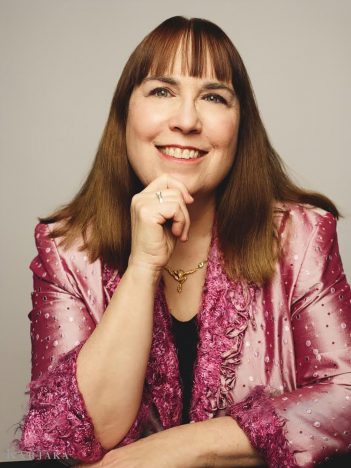Composer Lori Laitman shared her story of the courageous boys from Terezin.
Laitman served as the guest speaker for the Holocaust Remembrance Ceremony that was held virtually April 24 because of COVID-19 gathering restrictions. Carmel Mayor Jim Brainard and other leaders provided video comments, which were part of the program, along with taped portions of the 2019 ceremony.

Laitman collaborated with librettist David Mason on “Vedem,” a Holocaust-themed oratorial commissioned by Music of Remembrance. It was supposed to be performed as part of “Brundibar & Vedem” by the Indianapolis Opera April 24-26, but that has been postponed until 2021.
Laitman, who lives in Potomac, Md., said the words from the boys provided her all the inspiration she needed for “Vedem,” which debuted in May 2010.
“Vedem,” which means “In the Lead,” was the name of the Czech-language literary magazine that existed in Terezin, a hybrid of a ghetto and concentration camp in Czechoslovakia (now the Czech Repuplic) during World War II. The secret magazine was produced by boys living in the Home One barracks.
“Each week, they contributed stories, poems, drawings and essays,” said Laitman, an American composer of Jewish heritage. “They shared contributions by reading out loud to each other every Friday night from 1942 to 1944, even though discovery could have meant death. For them, the magazine was an important creative outlet during darkest despair.”
By 1944, most of the boys who produced the secret magazine had been sent to the death camps. Sidney Taussig was spared because his father, a blacksmith for the Nazis, convinced the Nazis he needed his son’s help. Taussig buried the pages of the magazine in a metal box and later retrieved them after the camp was liberated by the Allied Forces in 1945.
Laitman relayed the history of Terezin, which the Nazis overtook when it captured Czechoslovakia in 1939.
“For many, Terezin was a stop on the way to the death camps, and for some of the elderly it was their final stop,” Laitman said. “The conditions were awful and run by the SS, but they didn’t live inside the walls. By June 1942, the Nazis had decided on the Final Solution, with the goal of exterminating all the Jews of Europe, but they sought to conceal it.”
Laitman said musical instruments were initially forbidden but smuggled in, sometimes in pieces.
“Concerts were presented in secret until rules were later relaxed and concerts were later allowed,” she said. “There were several orchestras, cabarets and theatrical performances. Some, like the ‘Brundibar’ performance, were filmed as propaganda. The children of Terezin lived separate from the adults, and efforts were made to make their lives as normal as possible.”
Art lessons and soccer games were conducted and classes were taught. Home One barracks included the oldest boys in the camp, between the ages of 13 and 14.
“They came from different backgrounds. Some had been orphans, some were spoiled,” Laitman said. “Now, they shared a common misery separated from their families, surrounded by filth, hunger, illness and sleep deprivation. They became witnesses to cruelness and death.”
Laitman said the commission from Music of Remembrance, founded and run by Mina Miller, was special. Mason included six original poems from the magazine in the piece.
Laitman said she and Mason were grateful to meet with with four of the then-six living survivors who attended the premiere in 2010.
“It was an experience that we will never forget,” she said. “They all had an indomitable spirit and were able to go on and enjoy life. That’s a lesson for us all.”
Taussig, a 90-year-old resident of West Palm Beach, Fla., was originally scheduled to be the special guest speaker for the Carmel ceremony before the pandemic.
For the postponed Indianapolis Opera production of Vedem, Laitman said she revised sections of the score and also created a new duet version for mezzo-soprano and tenor, with clarinet and piano accompaniment of the last solo song “Farewell to Summer,” a poem by Zdenek Ornest, which was originally scored for mezzo-soprano, clarinet and piano.
Young Artists of Indianapolis Opera presented a video performance of the song for the ceremony.




